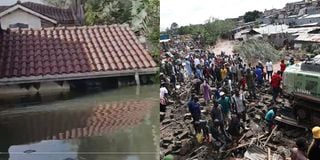Premium
Flood demolitions: A tale of two laws for rich and poor

Left: A submerged house in Runda estate and ongoing demolitions in Mathare slums.
As demolitions continue in Kenya's slums, targeting structures built on riparian land on the orders of President William Ruto, such activity is not taking place in Nairobi's posh estates.
President Ruto last week ordered people living within 30 metres of rivers to move out with immediate effect and their structures to be demolished.
“We will be asking those who are living in areas that are at high risk of mudslides and floods to vacate and we will help them because we want to save their lives," said the Head of State.
In the Mathare slums, where the President visited on Monday, demolitions continued as affected residents continued to move out of houses built along the Nairobi River.
On Monday, residents fought running battles with police as they resisted the forced evictions. The violence led to the death of a 17-year-old boy.
The bridge linking the Mathare slums and the Kiamaiko area was already under water, forcing the government to order the construction of another, higher bridge for locals to use.
Drama was witnessed near the bridge when a bulldozer arrived to demolish one of the houses as some of the locals had not moved out and showed no signs of doing so.
"I have nowhere to go, all that needs to happen is for the government to give me an alternative (place to live) and only then I will move," said Vincent Makori.
Compensated with Sh10,000
Mr Evans Loito, a local resident, asked President Ruto to honour his promise that those affected would be compensated with Sh10,000.
Mr Loito said most of the people affected by the ongoing evictions were those who could barely afford one meal a day.
"It is important for the Head of State to look into this matter and ensure that every affected person gets what he promised when he came here," he said.
He also wondered why the locals were engaging the police in a running battle when it was really important to move out of the riparian land.
If there is one man who thanks God for being alive today, it is none other than Mr James Chepkwony, who was last week submerged in water due to the heavy rains that lashed the country on the eve of Labour Day.
Speaking to the Nation in Mathare, Mr Chepkwony said he was submerged in water but managed to come out.
He said he supported the Head of State's order for people living on riverine land to move out.
"I support the initiative, but for sure we will ask for compensation so that we can move to other places," he said.
The place where he was living has already been flooded and the shack he was living in has been demolished.
Mr Chepkwony said he had no other place to call home and was forced to beg friends for a place to sleep.
"I am a driver but I have never gone to work, I am sure my company has even replaced me. I just hope the president will make sure we get what he promised," he said.
Entered their fourth day
It was no different in Mukuru Kwa Reuben as the demolitions entered their fourth day.
Some residents were busy salvaging their belongings as the bulldozer continued to demolish structures built on the riverbank.
Kenya Power workers were also busy removing electricity poles and wires from the area.
Three people have already lost their lives in the ongoing demolitions.
But the seriousness of the demolition of houses built on waterfront land within the slums is not evident in Runda Estate.
Here it is business as usual, although some hotels and homesteads affected by the floods are using diesel generators to pump water from their compounds onto the road.
This was witnessed at Lord Eroll Hotel where water is being pumped from the premises to 89 Ruaka Road.
Inside the compound on Monday, two staff members were busy trying to drain the water with a sky-blue boat.
When the Nation team arrived at the entrance, a guard quickly turned them away, saying he was acting on strict orders.
"The management has refused media interviews and no one is allowed inside for the time being," the guard said. He then asked them to leave.
When the Nation contacted the hotel management, calls were not answered.





